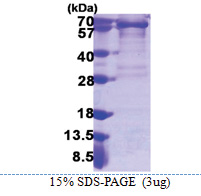CD140a / PDGFRA (24-524, His-tag) Human Protein
Other products for "PDGFRA"
Specifications
| Product Data | |
| Species | Human |
| Expression Host | E. coli |
| Expression cDNA Clone or AA Sequence |
MGSSHHHHHH SSGLVPRGSH MQLSLPSILP NENEKVVQLN SSFSLRCFGE SEVSWQYPMS EEESSDVEIR NEENNSGLFV TVLEVSSASA AHTGLYTCYY NHTQTEENEL EGRHIYIYVP DPDVAFVPLG MTDYLVIVED DDSAIIPCRT TDPETPVTLH NSEGVVPASY DSRQGFNGTF TVGPYICEAT VKGKKFQTIP FNVYALKATS ELDLEMEALK TVYKSGETIV VTCAVFNNEV VDLQWTYPGE VKGKGITMLE EIKVPSIKLV YTLTVPEATV KDSGDYECAA RQATREVKEM KKVTISVHEK GFIEIKPTFS QLEAVNLHEV KHFVVEVRAY PPPRISWLKN NLTLIENLTE ITTDVEKIQE IRYRSKLKLI RAKEEDSGHY TIVAQNEDAV KSYTFELLTQ VPSSILDLVD DHHGSTGGQT VRCTAEGTPL PDIEWMICKD IKKCNNETSW TILANNVSNI ITEIHSRDRS TVEGRVTFAK VEETIAVRCL AKNLLGAENR ELKLVAPTLR SE
|
| Tag | His-tag |
| Predicted MW | 58.4 kDa |
| Concentration | lot specific |
| Purity | >85% |
| Buffer | Presentation State: Purified State: Liquid purified Ig fraction Buffer System: 20mM Tris-HCl buffer (pH 8.0) containing 20% glycerol, 0.1M NaCl, 1mM DTT |
| Preparation | Liquid purified Ig fraction |
| Protein Description | Recombinant human PDGFRa protein, fused to His-tag at N-terminus, was expressed in E.coli and purifed by conventional chromatography, after refolding of the isolated inclusion bodies in a renaturation buffer. |
| Storage | Store undiluted at 2-8°C for up to two weeks or (in aliquots) at -20°C or -70°C for longer. Avoid repeated freezing and thawing. |
| Stability | Shelf life: one year from despatch. |
| Reference Data | |
| RefSeq | NP_001334756 |
| Locus ID | 5156 |
| Cytogenetics | 4q12 |
| Synonyms | CD140A; PDGFR-2; PDGFR2 |
| Summary | 'This gene encodes a cell surface tyrosine kinase receptor for members of the platelet-derived growth factor family. These growth factors are mitogens for cells of mesenchymal origin. The identity of the growth factor bound to a receptor monomer determines whether the functional receptor is a homodimer or a heterodimer, composed of both platelet-derived growth factor receptor alpha and beta polypeptides. Studies suggest that this gene plays a role in organ development, wound healing, and tumor progression. Mutations in this gene have been associated with idiopathic hypereosinophilic syndrome, somatic and familial gastrointestinal stromal tumors, and a variety of other cancers. [provided by RefSeq, Mar 2012]' |
| Protein Families | Druggable Genome, ES Cell Differentiation/IPS, Protein Kinase, Transmembrane |
| Protein Pathways | Calcium signaling pathway, Colorectal cancer, Cytokine-cytokine receptor interaction, Endocytosis, Focal adhesion, Gap junction, Glioma, MAPK signaling pathway, Melanoma, Pathways in cancer, Prostate cancer, Regulation of actin cytoskeleton |
Documents
| FAQs |
Resources
Recombinant Protein Resources |
{0} Product Review(s)
0 Product Review(s)
Submit review
Be the first one to submit a review
Product Citations
*Delivery time may vary from web posted schedule. Occasional delays may occur due to unforeseen
complexities in the preparation of your product. International customers may expect an additional 1-2 weeks
in shipping.






























































































































































































































































 Germany
Germany
 Japan
Japan
 United Kingdom
United Kingdom
 China
China
